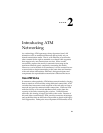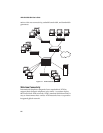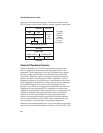
2-3
Introducing ATM Networking
Scaleable bandwidth
ATM defines how ATM end-stations, such as your PC or
workstation, connect to ATM switches and how ATM switches
interconnect with each other. Because these various connections
consist of dedicated links, their construction (metal wire or fiber
optic) and the transmission speed they support may vary from link
to link. When connections require higher speed, it is usually easy to
upgrade the connection without disrupting other network nodes
and switches, upgrading transmission bandwidth only where
necessary.
Bandwidth guarantees
Whenever one ATM node communicates with another, it uses a
virtual connection that disguises the fact that connections actually
traverse shared media. In this way, ATM networks make it appear
that connections are dedicated. Only if the necessary bandwidth is
available along the entire route does the connection setup complete
successfully. ATM’s guaranteed bandwidth allows connections to
transport audio, video, and image data that is sensitive to time
delays that occur when bandwidth is unpredictable as it is with
Ethernet.
To further improve transmission predictability, ATM networks
transmit small, 53 byte messages, called cells. A cell contains 48 data
bytes and a five-byte header. Since ATM transmission media only
transport only one cell at a time, the small message size allows
switches and nodes to transmit high priority cells with minimum
delay. If switches are transmitting lower priority cells when a high
priority cell arrives, higher priority cell transmission quickly
commences when the lower priority transmission completes.
Node Identification
ATM end stations (nodes such as workstations) each have a unique
connection to any ATM switch to which they connect. The
connection point at the switch is called a switch port and the switch
is a local switch for the node. ATM nodes each have a globally-unique
network address. There are various address schemes but, in most
cases, nodes receive their assigned network address from the switch.


















